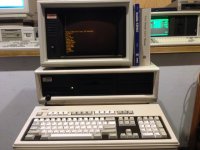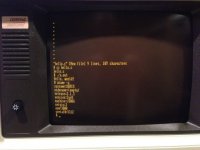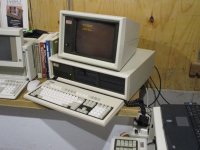resman
Veteran Member
An Epic:
Spotting a pristine Compaq amber monitor and an original DeskPro on ePay prompted a headlong descent into building the perfect 8086 Xenix computer. After procuring a Compaq Extended keyboard (I really dislike the original keyboard, and the DeskPro didn't come with one anyway), I almost had a complete machine. Unfortunately the DeskPro was packed in nothing from the seller. Just wrapped in cardboard. As a testament to the build quality of these beasts, some of the internal support plastic shattered (including the door cam on the floppy drive) and the ST-225 just wouldn't write and read anymore. So I had to get another one of those, which arrived in short order and only had about 300K of bad tracks. Now, most of you know the exterior plastics used in this generation of computers shifts to a nasty brownish color over time. The solution (pun intended) is to give them an OxyClean bath in bright sunshine for a day. No peroxide required, and it brings them back about 90-95%. Without further ado, here is the result:

I installed the Xenix 8086 that is available on the net, but I wanted to be able to develop on it. I don't know of any development system just for the 8086, but there is the 286 version here: http://www.vintage-computer.com/vcforum/showthread.php?30490-Xenix-Development-Systems
Take note of the close-up of the screen:

To install the development system, know that the image files are just tar files. You can un-tar them in the root directory and get all the files installed. Afterwards, there are scripts in /tmp that have to be run to finalize the install. Getting the tar files onto the DeskPro was a bit of a challenge, though. The image files are for 1.2 Mb floppies, the DeskPro only has 360K floppies. The approach I took was to break the 1.2 Mb image files into 360K chunks under Linux, transfer them to a Zip100 drive, move to a Compaq Portable to write the images to floppy with rawrite, then import them into Xenix with dd. Finally, each 1.2 Mb image was reconstructed with 'cat', from the 4 360K files. Then the image file (really a tar file), was un-tarred and the constituent files deleted to make room for the next image. I only have a 20 Mb hard disk in the DeskPro, so free space is at a premium; there is much juggling to be done to get everything installed without running out of space.
Not all is perfect, though. For some reason, the <sys/*.h> files don't get installed. I can't find them in the development system images. The DOS versions are there, but not the Xenix versions. Maybe I'm missing something. I'd love to hear back if anyone knows where they exist.
Well, that was the past week-and-a-half project. Returning to the regular scheduled program.
Dave...
Spotting a pristine Compaq amber monitor and an original DeskPro on ePay prompted a headlong descent into building the perfect 8086 Xenix computer. After procuring a Compaq Extended keyboard (I really dislike the original keyboard, and the DeskPro didn't come with one anyway), I almost had a complete machine. Unfortunately the DeskPro was packed in nothing from the seller. Just wrapped in cardboard. As a testament to the build quality of these beasts, some of the internal support plastic shattered (including the door cam on the floppy drive) and the ST-225 just wouldn't write and read anymore. So I had to get another one of those, which arrived in short order and only had about 300K of bad tracks. Now, most of you know the exterior plastics used in this generation of computers shifts to a nasty brownish color over time. The solution (pun intended) is to give them an OxyClean bath in bright sunshine for a day. No peroxide required, and it brings them back about 90-95%. Without further ado, here is the result:

I installed the Xenix 8086 that is available on the net, but I wanted to be able to develop on it. I don't know of any development system just for the 8086, but there is the 286 version here: http://www.vintage-computer.com/vcforum/showthread.php?30490-Xenix-Development-Systems
Take note of the close-up of the screen:

To install the development system, know that the image files are just tar files. You can un-tar them in the root directory and get all the files installed. Afterwards, there are scripts in /tmp that have to be run to finalize the install. Getting the tar files onto the DeskPro was a bit of a challenge, though. The image files are for 1.2 Mb floppies, the DeskPro only has 360K floppies. The approach I took was to break the 1.2 Mb image files into 360K chunks under Linux, transfer them to a Zip100 drive, move to a Compaq Portable to write the images to floppy with rawrite, then import them into Xenix with dd. Finally, each 1.2 Mb image was reconstructed with 'cat', from the 4 360K files. Then the image file (really a tar file), was un-tarred and the constituent files deleted to make room for the next image. I only have a 20 Mb hard disk in the DeskPro, so free space is at a premium; there is much juggling to be done to get everything installed without running out of space.
Not all is perfect, though. For some reason, the <sys/*.h> files don't get installed. I can't find them in the development system images. The DOS versions are there, but not the Xenix versions. Maybe I'm missing something. I'd love to hear back if anyone knows where they exist.
Well, that was the past week-and-a-half project. Returning to the regular scheduled program.
Dave...

